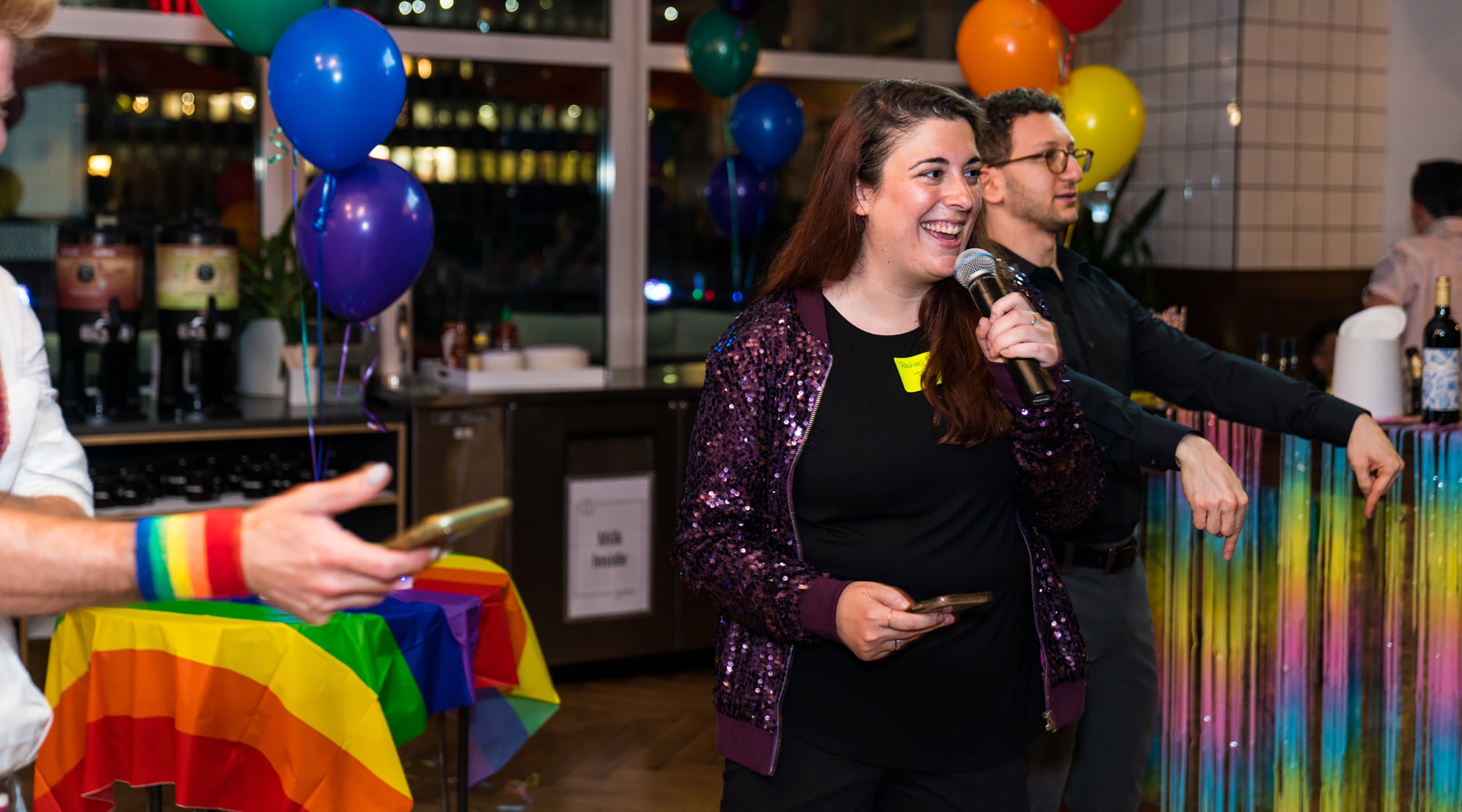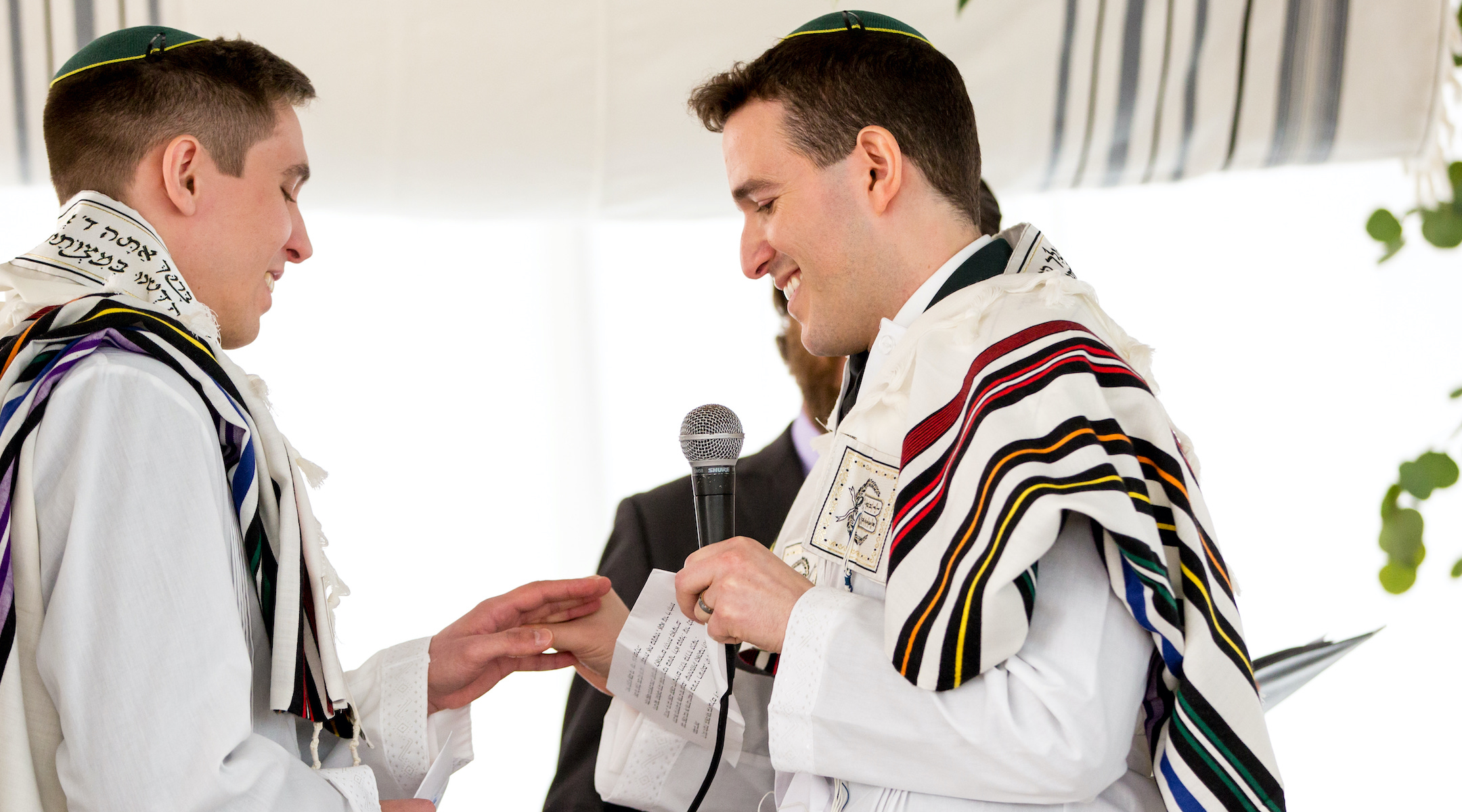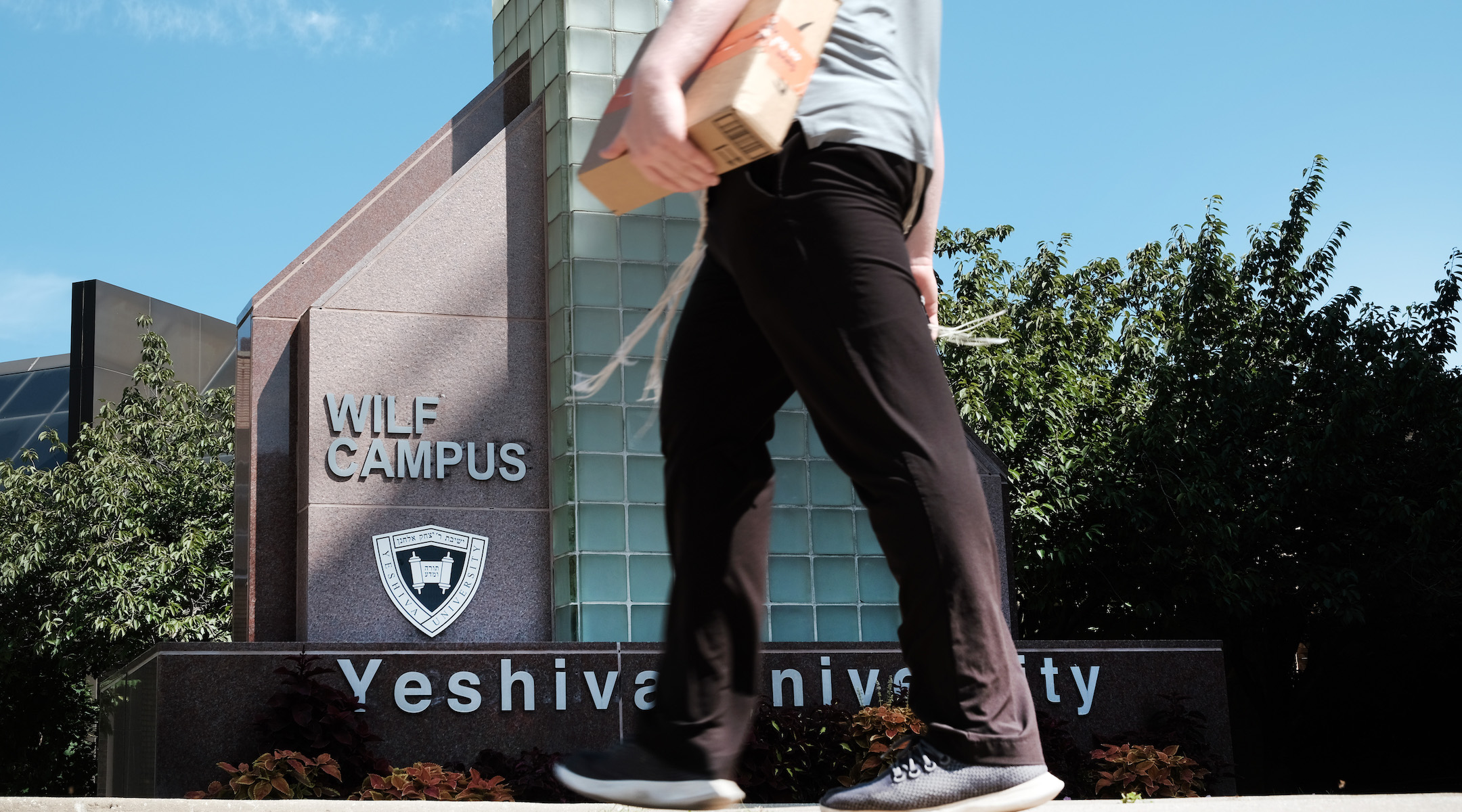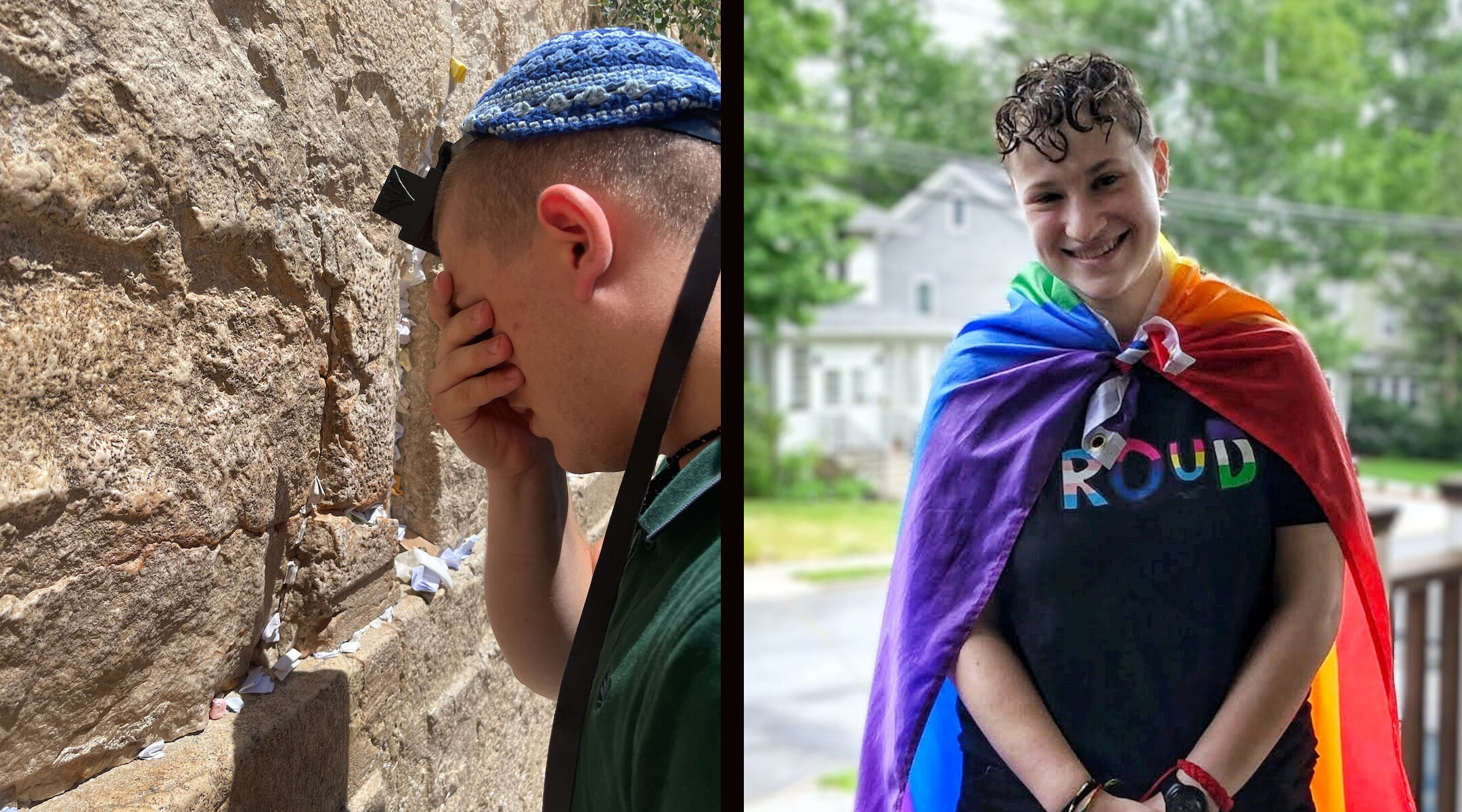This article was produced as part of JTA’s Teen Journalism Fellowship, a program that works with Jewish teens around the world to report on issues that affect their lives.
(JTA) — Until recently, Jacob Feldon considered Yeshiva University a serious candidate for his college education. As a senior at a Utah high school who has embraced Modern Orthodoxy and harbors dreams of potentially becoming a rabbi, he said he was drawn to “the idea of going to school in an observant community where I can study Torah and Talmud with some of the smartest people doing such a thing today.”
But Feldon is also bisexual and serves as a Jewish youth ambassador for Beloved Arise, a national interfaith support organization for queer youth. So Feldon took notice when Yeshiva University declined to officially recognize a Pride Alliance group on campus, and then pressed its case to the U.S. Supreme Court when mandated to do so.
“As a queer man I can’t see going into that environment right now with everything happening,” Feldon told the Jewish Telegraphic Agency. “I’m getting a pretty clear message that I won’t be welcomed, authentically welcome.”
Feldon is not the only high school student who identifies as Modern Orthodox to have complicated feelings about Yeshiva University at the moment. As the main Modern Orthodox university, the school blends secular and religious instruction and values. Its attempt to navigate a balance between being welcoming and inclusive and fighting for the right to control LGBTQ students’ official expression on campus has made national headlines — and caused some Modern Orthodox teens to question whether they would feel comfortable attending.
For LGBTQ teens, the lawsuit and other controversies around gender and sexuality in Modern Orthodoxy have created “a little hopelessness,” said Rachael Fried, executive director of the support nonprofit Jewish Queer Youth.
Fried described the mindset of Modern Orthodox LGBTQ adolescents as, “I’m trying to live an Orthodox life. I’m trying to build my future as a queer Orthodox person, and this is what the main, flagship institution of Modern Orthodoxy thinks about me. Then where is my future and what’s the hope for me and what are my dreams?”
For queer teens, the Y.U. saga is just one high-profile touchpoint in an ongoing grappling with their place within Modern Orthodoxy. Modern Orthodox communities range widely in many ways depending on their history, geography and leadership, meaning that some queer Orthodox teens say they have found acceptance and support while others say they’ve had more challenging experiences.

Rachael Fried is the executive director of the support nonprofit Jewish Queer Youth. (Courtesy JQY)
Often teens say they experience both. Like many of the queer teens interviewed for this article, Rivka Schafer and their parents first thought it best to keep their queer identity private due to the repercussions they feared with being LGBTQ in a Modern Orthodox community. When they did come out in middle school, Schafer said they received mixed reactions in their Jewish day school.
“The kids had a lot of stigma and the administration did too, but they tried to be really accepting and really supportive which was also really, really beautiful,” Schafer told JTA.
“Currently I identify as Modern Orthodox because Judaism is a really important part of my identity and I find Judaism to be really meaningful to me,” said Schafer, who is nonbinary, from their home in Teaneck, New Jersey. “So although I struggled a lot with the acceptance in the Jewish community, and stigma within the Orthodox community, I really ultimately believe it is and should be a strong part of who I am.”
But while Schafer has remained committed to their religious identity, Fried, of Jewish Queer Youth, said the Pride Alliance lawsuit and other LGBTQ-related controversies sometimes “pushes people away from Orthodoxy in a really unfortunate way.”
This is what happened to Mattie Schaffer. “I would describe it as [having] a religious identity crisis,” said Schaffer, a student at Lev Miriam Learning Studio in Passaic, New Jersey who uses he/they pronouns and identifies as queer. Schaffer, 16, said their neighborhood is a more right-wing Modern Orthodox community, colloquially called yeshivish, though his family is not.
“A part of all the alienation and isolation comes from a feeling of not having a place anywhere,” Schaffer said. “And as much as you try to conform, there just isn’t really a place for you to fit unless you want to be sticking out or be bending yourself in half.”
Modern Orthodox queer teens’ feeling “of not having a place” can be quite literal, particularly for those teens that are non-binary or transgender, said Schafer, the teen from Teaneck.
Schafer finds their nonbinary identity sometimes at odds with even the most basic rules of the Hebrew language, which assigns a gender to nearly all words, and of their synagogue. “Where do I stand? On the mechitza?” they asked, referring to the divider separating men and women in Orthodox synagogues.
The question of LGBTQ individuals in gender-separated prayer spaces recently reared up at Y.U., when one of its leading rabbis decreed that a transgender woman could not pray in either the women’s or men’s section of her university-affiliated synagogue.
But while recent months have been abundant in controversy, the last decade has shown tremendous progress for LGBTQ Modern Orthodox teens, according to multiple people in and around the community.
Rabbi Steve Greenberg, who was ordained by Yeshiva University before coming out as gay in 1999, heads the Orthodox queer advocacy group Eshel. His organization surveyed approximately 240 Orthodox synagogues and rabbis and found that 74% of interviewees were “high welcoming,” meaning that “inclusion is explicit, principled and broadly acknowledged” and queer families’ life cycle events other than marriage are celebrated. Another 22% offered “moderate welcome,” while 4% were “low welcoming/inattentive.”

Nadiv Schorer, right, married Ariel Meiri in 2020 with Orthodox rabbi Avram Mlotek officiating. (David Perlman Photography)
Approximately 10 rabbis said they were willing to perform same-sex marriages, according to Eshel’s research.
“They do their best to make it possible for LGBTQ folks to belong to Orthodox environments,” said Greenberg. “And it’s grown.”
The head of school at North Shore Hebrew Academy on Long Island, Rabbi Jeffery Kobrin, said he believed that growing conversations about LGBTQ issues in Orthodox communities has had benefits.
“I think it’s easier to be a queer teen now than it was in 2012, just because it’s more out there,” Kobrin said. “People talk about it more, people try to be more accepting of it, and people, community-wise, seem to less feel this contradiction between Orthodoxy and alternative lifestyles.”
Some teens say they have witnessed change in just the last couple of years. Benjamin Small, a gay teen who graduated from SAR High School last year and now attends Yeshivat Ma’ale Gilboa in Israel, said his rabbi, Chaim Poupko, of Congregation Avahath Torah in Englewood, New Jersey, has advocated for queer members of the Orthodox community in his synagogue.
“That would be unheard of two or three years ago,” Small said.
Few Modern Orthodox schools in the New York area have an LGBTQ support club. But Fried, JQY’s executive director, said students are learning how to organize and build community independently, in the absence of recognition from their schools and synagogues.
“That comes with people choosing themselves, feeling empowered to build their own communities and to step-up and create the groups that others are not creating for them,” she said.
Before the Y.U. court case, “the messaging that I heard from the Modern Orthodox community was ‘your identity is not wrong, and we want to support our queer members of the community,’” said Fried, whose organization gave grants to student groups affected by the Y.U. case.
But now, she said, the message that queer Modern Orthodox teens are hearing has shifted.
“Actually, your queer identity is what is problematic. It’s not just the sentence in the Torah that is about behavior, but actually your identity,” she characterized Modern Orthodox institutions as saying. “You want to gather and build community that is based around identity and that, in and of itself, is problematic, and it’s inherently a threat.”
For its part, Yeshiva University has tried to thread a narrow needle.

A person walks by the Wilf Campus of Yeshiva University in New York City, Aug. 30, 2022. (Spencer Platt/Getty Images)
“We love all of our students including those who identify as LGBTQ,” Y.U. said in a FAQ after it launched a school-sanctioned LGBTQ club. “Through our deep personal relationships and conversations with them, we have felt their struggles to fit into an orthodox world that could appear to them as not having a place for them.” (The YU Pride Alliance called the new club “a feeble attempt” at compromise and said they were not involved in its formation.)
There was no consensus among teens who spoke to JTA about how much the Y.U. saga would affect inclusion in other spaces. It’s also unclear the degree to which queer Modern Orthodox teens and their allies are incorporating the situation in their decision-making about college.
Y.U. declined to share student enrollment and admissions data, saying that the university does not generally release that information. But according to a recent Y.U. advertisement, last fall the school had “the largest incoming undergraduate class in over 20 years.”
Still, the school’s lawsuit and rhetoric has been a turnoff for 19-year-old Penny Laser, a queer student at a secular college who had envisioned possibly pursuing graduate studies in Talmud at Y.U. and grew up in a non-Orthodox household. (Laser asked to be identified using a pseudonym because she is seeking a giyur lechumra, a conversion for Jewish individuals to remove any doubt of their Orthodox Jewish legal status, and feared the Rabbinical Council of America would not grant her one if she was quoted in this article.)
“I’m not sure how I can trust or engage with Y.U. in the future,” said Laser. “A. I don’t know if it’s going to be a safe place for me, and B. I don’t want to align myself with an institution that has values like this.”
Schafer, from Teaneck, and Schaffer, from Passaic, are both not considering Y.U.
And the consequences of the Y.U. litigation goes beyond influencing the decisions of individual students, according to Fried.
“What the Y.U. situation is doing right now is forcing this conversation into the spotlight,” she said. “So different institutions and leaders are forced into having this conversation, or even thinking about where they stand. People are asking them to communicate where they stand.”
Feldon, from Utah, has hope. He thinks that the Modern Orthodox world needs queer rabbis to lead the conversation on inclusion from a halachic perspective — and he thinks that can still happen, despite the push by Modern Orthodoxy’s flagship university to block the Pride Alliance.
“I choose to believe,” said Feldon, “that we’ll get there. My dream life is where I can bring my boyfriend to minyan [prayer services] three times a day. And I choose to believe that we are on that path.”
JTA has documented Jewish history in real-time for over a century. Keep our journalism strong by joining us in supporting independent, award-winning reporting.






